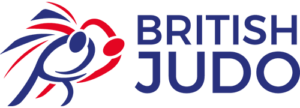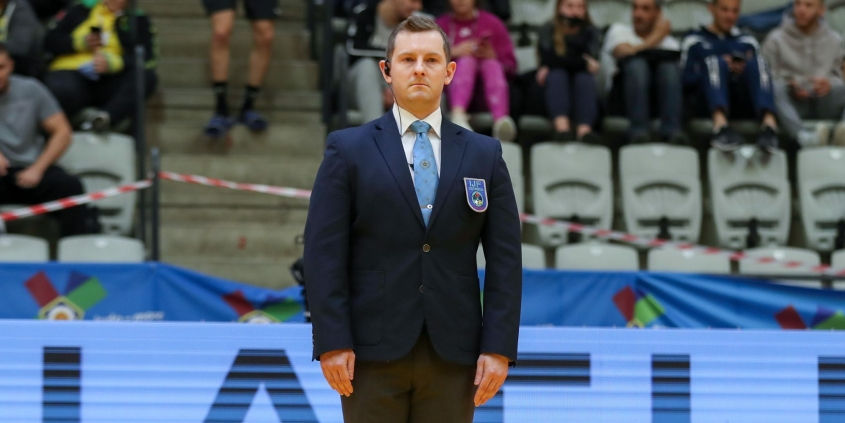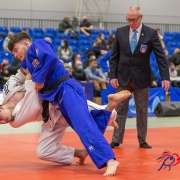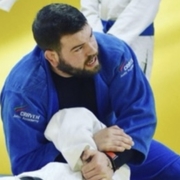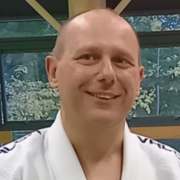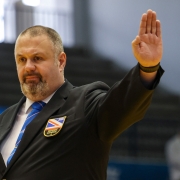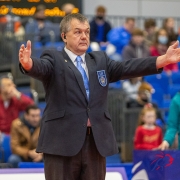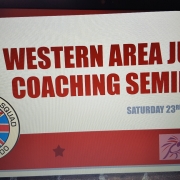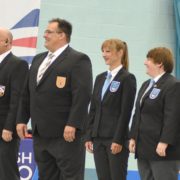Meet The Referee – Archi Shrimpton
Name: Archi Shrimpton
Club: Samurai Judo Club
What is your judo background?
I’ve been in judo for 21 years. I started at Samurai JC in Kidderminster, aged 14. Samurai gave me my grounding in judo and I worked through the grades to competitive 1st dan. It was here I picked up refereeing, aided by the many events run by the club giving an opportunity to practice and the positive approach to involving members in officiating.
I left Kidderminster for Sheffield University and was fortunate that they had an active judo club. Whilst at university I fought for my 2nd dan, led SUJC as it’s club captain, fought at BUCS Nationals (then BUSA) each year and I later had a short stint coaching at Leeds University JC. I’m now in London training at Stratford Judokwai.
A couple of injuries and my career has frustrated much of my progress since university, but I completed my technical 3rd dan last year and I’ve been back on the mat in recent years picking up points for my competitive 3rd dan as well as the odd medal. I’m unlikely to astound with a glittering competitive career, but a referee still having a go in competition is something.
Where are you in your refereeing journey?
I’m fast approaching my twentieth year as a referee. In that time I’ve climbed the rungs from junior referee through the national ranks and in 2015 became an IJF Continental referee in Belgrade, Serbia. This was the culmination of a lot of work, as well as the generous support and mentoring from among the best in Britain. As an IJF referee, I’m proud to represent Great Britain at events across Europe, mostly European Cups and Continental Opens.
At this level, it’s very much a switch from being taught how to referee and where to improve, to taking responsibility for my own performance and development, as well as setting the standard for others and taking ownership of refereeing outcomes. This does take some time and practice to adjust to and on my part has required a good dose of humility, as well as the determination and commitment you’d expect of a senior referee.
Off the mat, I’m a member of the National Refereeing Commission. I also have the privilege to be referee in charge for a number of national events as well as many hosted by the London Area.
What has been your favourite moment as a referee?
Refereeing was the pathway that opened up being an official at the London 2012 Olympic Games as well as the 2014 Commonwealth Games. These were both highlights for me in judo, although not in refereeing roles.
While not a single moment, I especially enjoyed the preparation for my exam in Serbia, probably more than the result itself. This saw me tour events around Europe, gaining experience at European Cups and exposure to tough tactical fights and sharp colleagues. It was doing this which solidified in my mind that I was ‘good enough’, but it also introduced me to many referees from across the continent that I now count among my friends. I was also lucky to be joined for many of these trips along the way by Stefan Newbury and Lisa Rivers and in the moments we weren’t on the mat had the best of times exploring new cities.
What do you love most about refereeing?
In its best moments, there is a ‘flow state’ in refereeing where you become singularly focused on the contest in front you and everything else on your mind slips away. As an over-thinker and someone who can struggle to set aside the pressures of the day job, I really enjoy these moments of pure concentration when I’m able to referee to my absolute best.
What are your ambitions in refereeing?
I want to be that bit better each time I step on the mat. Often this means I’m thinking about the next couple of technical points I want to work on. At events I’ve got a small book on me, I keep notes of my technical mistakes (progressively more minor I hope), so I use that to reflect and improve.
That said, refereeing has a clear structure, my IJF International is a clear goal for me and is only one exam away now. From there I hope opportunities for bigger, stronger events can be earned and new goals set.
Overall though, I aspire to be viewed by my peers and others as a skilled, fair and approachable referee, someone that can be trusted to call it straight and to a consistently high standard. That’s a task that will never be finished, requiring continued focus contest after contest.
What advice do you have for anyone wanting to be a referee?
Take that first step – the basics come pretty quickly and you’ll soon work out if you enjoy it. Usually this means getting in touch with your area refereeing rep or finding a Club/Area refereeing course from the BJA calendar. If in doubt, ask me or any referee.
I’d add you don’t need to be the most outgoing, most confident person in the room to make a great referee. I’m not that person, lots of us aren’t. Your understanding of judo, commitment and willingness to learn are what matter – the rest we can work on and we’d be delighted to have you.
